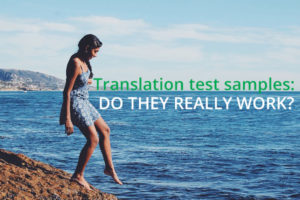Occasionally, the first thing a translation company representative hears when they are contacted by a new client about possible work is, “Great! We’re going to give you a translation test.” That’s understandable, isn’t it? Wouldn’t you want proof that the company that you’re about to hire has a competent linguist working on your materials?
You get the results back, and you like what you see. The linguist struck a tone that fits well with your company’s style and branding. No errors, the formatting looks great … excellent! That big job you’ll be sending through in a few days? It’s going be handled well. Right?
Not necessarily. Actually, you could be at risk. You just got caught by a common fundamental misunderstanding that a successful translation test is a guarantee of future quality. They often aren’t.
Let’s explore what we mean by, “you’re at risk.” And the good news is, that we’ll share solutions on how you can effectively vet new translation companies and go into your relationship with a high level of confidence re: future success.
LET’S START BY LOOKING AT HOW TRANSLATION TESTS DO WORK.
Translation tests work in terms of giving you a look at a sample of the quality of a potential resource: the specific linguist that completed the test. Unfortunately, though, that’s not the whole story. They are just one talented resource in a pool of many linguists who may be working on your content. There is no guarantee that that specific resource will be working on future assignments from you.
NOW, LET’S LOOK AT HOW SAMPLE TRANSLATIONS DON’T WORK.
A single translation test is only part of a larger story. You need a look at the whole, not a snapshot of a part. Try to get insight into the translation providers enterprise-level quality and ability to scale to meet your needs as they shift. The challenge is, like writing, translation can be subjective. Quality translation is achieved through a few important steps.
GREAT. SO NOW WHAT DO I DO?
Let’s look at what you need to know to determine if your translation provider consistently deliver quality work.
- Who’s available? You can’t count on the same resource being available to work on your company’s content at any given time. A mature translation company will have a team of linguists dedicated to you as a client. What is the depth of your resource pool?
- Can you ramp up new resources quickly? Do you have processes in place to quickly and effectively onboard new resources to your translation teams? This will make scaling up quickly an opportunity to succeed, not a point of failure.
- Do you leverage glossaries correctly? A robust language glossary is a dynamic, living thing; it should be updated and used all the time. You need a dedicated team who remains aware of, and applies your glossary on an ongoing basis. Does your team have good due diligence around using glossaries, or do your linguists sometimes forget to use them?
You can see the bigger picture in wanting to test a new translation vendor: enterprise-level translation is a living, breathing, fluid requirement that requires a robust, well-managed team of linguists who are well-supported in delivering the ongoing top quality that you need. How can you verify that your vendor is helping ensure team consistency, training and support over the lifecycle of your documents being translated? A single translation test doesn’t do a good job of testing for that. You asking the right questions, though, can. We look forward to answering your questions, and seeing how we and our award-winning translation process can help you. Contact us today!
Google+ Facebook LinkedIn Twitter Instagram

